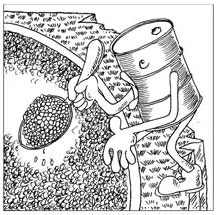
For some time now the world has been experiencing a rise in food prices. It is important for China not just because it has a long history as an agricultural nation, but also because of terrible memories of past famines.
Food items make up one-third of China's consumer price index, a key measure of inflation, and can trigger quick readjustments by officials in charge of the economy's short-term stability.
All housewives wish, after seeing meat and cooking oil double or almost triple in prices, that the government adopts tough measures to ease their concerns. However, from the National People's Congress (NPC), which closed its annual session in Beijing last week, people did not hear a pledge for no more rise in prices. The premier did address concerns about inflation, and say that things would be done to make price rises more modest, or less painful. But he said nothing about price capping or fixing.
The government would be making a mistake if it did promise this, or if it left an impression that it would attempt to do so. Agricultural experts were wise enough to tell the lawmakers and the press covering the NPC about their long-term study. Food prices in the entire world were following an upward curve, they said.
Indeed, and we may be only at the beginning of it. Driving up food prices are farmlands tasked not only to produce food but also biofuels as a replacement for increasingly costly petroleum.
It is not unlikely that the price of farmlands would eventually be equal to that of oilfields if the world has to depend on its ground resources (biofuel farms) as much as its underground resources. And the prices of both types of resources will be high considering dwindling crude oil reserves and the adverse impact of climate change, such as drought and desertification.
How can China, with a per capita farmland resource far below the world average but with the world's largest population, expect to be immune from the global economic trend? We would be fooling our children if we think they would still be buying beef or pork at the price we are familiar with today.

What a responsible government should do is to pass on signals from the marketplace - rising prices - to the people, so that they will be able to react by saving more or creating more.
Average consumers may find it difficult to understand food and energy competing in future for land resources. Some are pressing for more price caps and subsidies. Some are even blaming the WTO and China's low tariff rates on farm products.
But it is the duty of the government to reveal the whole picture - in a way not to provoke anger but to inspire more creative responses.
Consumers are people. Price rises can make them feel unhappy. But among them, there are always some who are creative and can take entrepreneurial initiatives once they figure out where opportunities lie. Whenever it occurs, inflation, as a sort of gauge between supply and demand, always points to where the new wealth is.
At a time when a major correction is happening in the domestic stock market, and when it is accepted by most investors as a given, it would make perfect sense for those with more cash, institutions and individuals, to redirect their interests to the farm sector.
Chinese corporations should also start to seek concessions from farmlands overseas to raise local yields, in food as well as biofuels.
Major funding should be made available for developing and spreading ways of saving water, recycling wasteland and polluted land, and producing biofuels more economically.
E-mail: younuo@chinadaily.com.cn
(China Daily 03/24/2008 page4)

